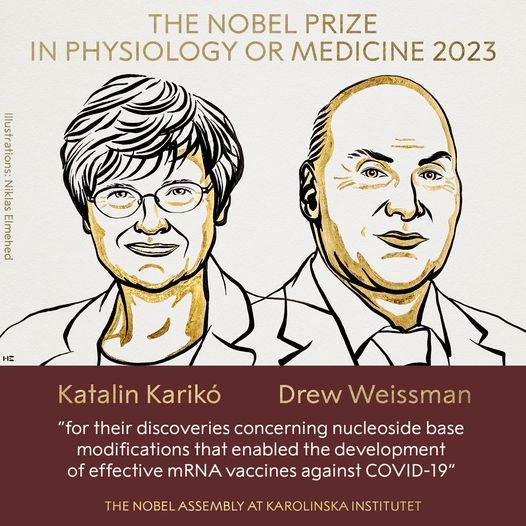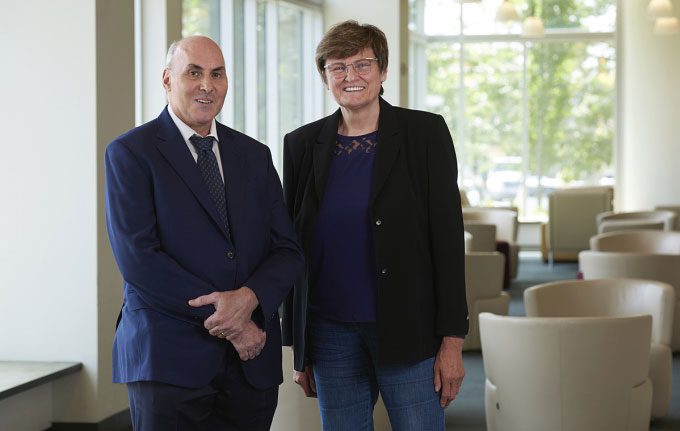The research on mRNA vaccines against Covid-19 by scientists Katalin Kariko and Drew Weissman has won the Nobel Prize in Physiology or Medicine for 2023.
During the ceremony held at 12:00 PM on October 2 (Stockholm time, which is 4:45 PM in Hanoi), representatives from the Royal Swedish Academy announced the award for this research. Katalin Kariko, a Hungarian national, is a professor of molecular biochemistry, while Drew Weissman is a professor and physician specialized in infectious diseases at the Perelman School of Medicine at the University of Pennsylvania (USA).

The two scientists who won the Nobel Prize in Medicine 2023.
“Through their groundbreaking discoveries, the two scientists have made significant contributions to the rapid development of vaccines during the pandemic,” the Nobel Committee stated.
According to Thomas Perlmann, the secretary of the Nobel Committee, both scientists were “overwhelmed by the news of their award.” Gunilla Karlsson Hedestam, a member of the award committee, remarked that the work of Professors Kariko and Weissman was “especially important in the early stages of the pandemic.“
Their discovery, published in 2005, paved the way for the development of the Pfizer and Moderna Covid-19 vaccines. This research also highlighted the potential of mRNA technology in combating other diseases such as HIV, cancer, autoimmune disorders, and genetic diseases.
Prior to this, Weissman and Kariko had worked together for two decades in the laboratory to develop mRNA technology. The first hurdle was that mRNA molecules are very fragile and would be immediately destroyed by cells once introduced into the body. This destruction process also triggered harmful inflammatory responses.
To address this issue, the two scientists made several modifications to the mRNA, rendering it non-inflammatory and allowing for the production of more proteins. This led to RNA that was safe for treatment without causing cytokine reactions, toxicity, or side effects.
At that time, traditional vaccines operated by introducing a virus or a part of the virus into the body, training the immune system to remember and attack the invading pathogens. In contrast, mRNA vaccines act as a coded instruction manual, allowing cells to produce viral proteins independently. Professors Weissman and Kariko argued that this mechanism better simulates the disease, eliciting a stronger immune response than traditional vaccines.
However, the scientific community initially overlooked this new work. Professor Weissman noted that their first paper in 2005 was rejected by both Nature and Science journals. Eventually, the research was published in a specialized journal named Immunity.
A few years later, the companies Moderna (USA) and BioNTech (Germany) took an interest in this work and invested in mRNA vaccine research to prevent diseases like influenza, cytomegalovirus, and other pathogens. However, none of these vaccines passed clinical trials for many years. It was not until 2019, with the emergence of Covid-19, that mRNA became a beacon of hope, enabling the vaccine development process to proceed at record speed and saving billions of lives.

Scientists Drew Weissman and Katalin Kariko. (Photo: Penn Medicine)
The laureates will receive a Nobel certificate, a Nobel medal, and a cash prize of 11 million Swedish kronor (approximately $989,000) on December 10. Scientists often have to wait many decades for their work to be recognized by the Nobel Committee.
In 2022, the Nobel Committee honored scientist Svante Pääbo for discoveries related to human evolution.
Before the Nobel Prize recognized Dr. Kariko and Professor Weissman, the VinFuture Prize in 2021, one of the first global science and technology awards, also honored the research work of Dr. Kariko and Professor Weissman. The recognition of Dr. Kariko and Professor Weissman by VinFuture two years prior to the Nobel demonstrates the vision and stature of the VinFuture Prize Committee. Despite being recognized by numerous prestigious international awards, the VinFuture Prize holds a special significance for Dr. Kariko. In a statement at the end of June 2023, she emphasized the importance of having scientific awards from developing countries, especially those that are prestigious, as they attract attention not only domestically but also globally. Dr. Kariko affirmed that through VinFuture, the world’s scientists have gained a better understanding of a Vietnam that is vigorously reaching out internationally. International awards like VinFuture not only inspire local scientists but also create interest and attention from countries with well-developed science and technology, thereby opening opportunities for collaboration and knowledge sharing, enhancing the advancement of science and technology globally, especially in developing nations. |
- Issues with the Nobel Prize’s three-person award rule
- 2023 Nobel Prize in Physics honors research on electrons
- 2023 Nobel Prize in Chemistry honors research on nanotechnology
- Norwegian author Jon Fosse wins the 2023 Nobel Prize in Literature
- Iranian women’s rights activist wins the 2023 Nobel Peace Prize
- 2023 Nobel Prize in Economics honors American female professor
- How a natural disaster 2.5 million years ago changed human evolution


















































